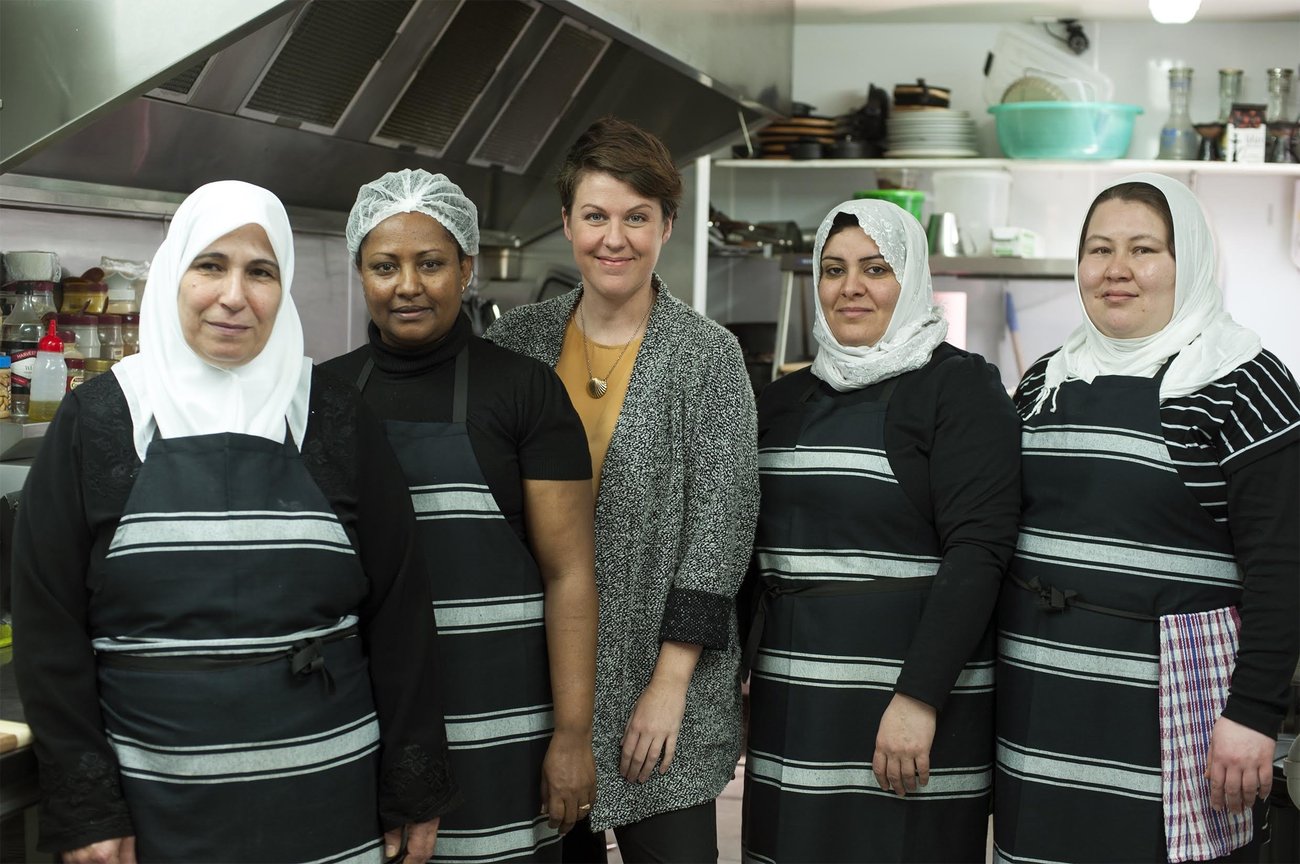Pomegranate Kitchen’s co-founder on the skills refugees can bring to the table

Pomegranate Kitchen general manager and co-founder Rebecca Stewart was working for the New Zealand Red Cross helping refugees when she saw firsthand a problem that was occurring.
Many of the refugees arriving in Wellington wanted to find employment, but they had no experience of working locally. As well as this, the low-skill jobs they were being offered, such as cleaning, weren’t making the most of their talents.
As a country, New Zealand increased its refugee quota from 750 to 1000 each year in 2016. To the disappointment of campaigners, the figure stopped short of the 1500 refugees Immigration New Zealand said the nation could take on.
But while articles have been filled with discussion about quotas, costs and immigration bans, the human aspect can get lost amongst the conversation – and with that, the skills refugees can bring to the table.
Stewart decided to make the most of food being an international language and found social enterprise Pomegranate Kitchen in late 2016.
It hires women from Afghanistan, Syria, Iran and Africa to cook for lunch deliveries and catering.

It also celebrates their cultures’ cuisines by offering a variety of dishes from their countries, such as Baklava, falafels and Kuku Sabzi (Persian frittata).
She says in light of the debate going on around immigration, refugees arriving in new countries aren’t always considered for their talents.
“It’s so easy to put a label of ‘refugee’ on someone and forget the complexities that make up a group of people,” Stewart says.
“Our cooks have various levels of English, varied educational levels before they arrived here, and various skills that they can bring. One is quite entrepreneurial and can lend her hand to anything – another has a steel trap mind for prices and bargains.
“There’s not just one type of person, but they are united by the fact that they have been put in more difficult and horrific circumstances than we can imagine. With that in mind I think the diversity of culture and different skills that they can bring can only make the ‘Kiwi’ way of life stronger.”

While Pomegranate Kitchen begun as a pop-up for individual lunch deliveries at Moore Wilsons, it has since grown within four months to offer group catering too – sometimes for crowds over 100.
Community support for the initiative has been immense, she says, with different companies banding together and donating everything from bags of mint from their garden to equipment to cook with.
“I think that generally people are seeing that the choices they make with their dollar and through their purchases are not neutral, and if they can get a great quality of food while also contributing to something they believe in – it’s a no-brainer.”
Providing employment aside, Pomegranate Kitchen also helps the women improve their English language skills and provides a community connection both to each other and the wider Wellington community.
“Our aim is to improve social and economic outcomes,” Stewart says.
But the responsibilities of the women working there aren’t just limited to cooking.
One of the company’s values is ‘No decisions about us without us – People from refugee backgrounds are involved at all levels of Pomegranate Kitchen.’
Stewart says when they started the business, they were hyperaware of falling into the trap of doing things ‘to’ or ‘for’ people rather than with them.
Though she’s currently general manager, she wants the Pomegranate Kitchen to transition into a business that’s owned and led by former refugees.
“At the moment we [myself and co-founder Ange Wither] are looking for someone from refugee background to sit on our board,” she says.
“Our head chef is a former refugee, and my intention is that in two years a former refugee will be in my general manager role too, and I will then sit on the board. Of course it will depend on the right person being available but I think setting that intention means we will have plenty of time to upskill and make it happen.”
For now, the business’ next step is looking for a commercial kitchen within its price range to move into, as currently it’s still operating out of another business’ premises, Adulis Restaurant.
There’s also plans in the works to run a six-week training course with a fundraising dinner at the end to extend the Pomegranate Kitchen’s reach to more former refugees.




